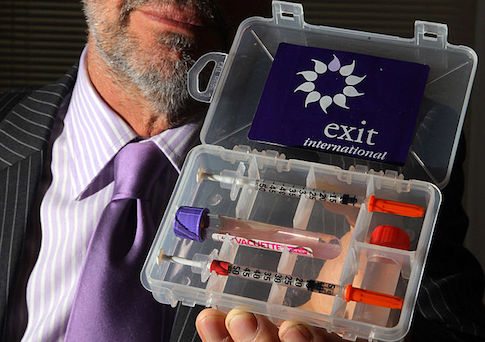America's largest doctors' lobby may reconsider its longstanding opposition to assisted suicide after its governing body voted to ignore its own ethics council.
On Monday, a majority of delegates from the American Medical Association refused to confirm the Council on Ethical and Judicial Affairs's recommendation that it continue to oppose assisted suicide. The council spent two years studying the issue following a resolution from the Oregon delegation asking the AMA to shift to a neutral position on the question of whether physicians can ethically prescribe lethal medication to a patient diagnosed as terminally ill. Its final report acknowledged that advocates of assisted suicide had made strides in advancing the practice and did not condemn physicians who participate in assisted suicide where it is legal, but recommended on maintaining the AMA's position that "Physician-assisted suicide is fundamentally incompatible with the physician's role as healer, would be difficult or impossible to control, and would pose serious societal risks."
"The Council on Ethical and Judicial Affairs therefore recommends that the Code of Medical Ethics not be amended," the council said in its report.
AMA delegates met in Chicago and voted not to adopt that recommendation. Instead it sent the issue back to the council for further study. Both advocates and opponents of assisted suicide said Monday's vote opened the door for the association to eventually withdraw its opposition to the practice.
Dr. Brian Callister, former president of the Nevada Medical Association who campaigned against a state bill to legalize assisted suicide, called the vote "a missed opportunity" to "show courage in standing up for what is right for our patients and our colleagues." He viewed the results as an effort to appease dissenting physicians, rather than to advocate for the rights of patients.
"I'm afraid they are more concerned about losing more members than they are about our doing what they know is the right thing, but the bottom line is that the AMA policy opposing physician-assisted suicide remains intact," Callister said in an email. "We need to ensure that the members of the House of Delegates take the time to learn more about the profound negative effects PAS has on our citizens and our society, and they need to stop fearing the repercussions of taking a stand on what they worry is a 'controversial issue.'"
The AMA declined an interview about the results, instead referring the Washington Free Beacon to a statement from immediate past president Dr. Andrew Gurman, who emphasized that "the existing guidance in the Code of Medical Ethics remains unchanged."
"The council's work and resulting report have added clarity to the issue and emphasized that physicians from all perspectives share a common commitment to the core values of care, compassion, respect, and dignity for their patients," he said.
Supporters of assisted suicide said while the position remains unchanged, the momentum of the debate points toward neutrality. The Massachusetts AMA shifted to such a position, overturning years of opposition, when a bill was introduced to legalize the practice in 2017. Despite its neutral stance, lawmakers rejected the measure in 2018. Dr. David Grube, who serves as national medical director at Compassion and Choices and has written numerous prescriptions for lethal medication in Oregon, praised the vote.
"Many of the AMA's constituent societies favor neutrality in order to respect and protect doctors and patients whether they decide to participate in this medical practice or not," Grube said in a release. "I'm heartened that the AMA House of Delegates is open to continuing to study and learn about this issue when there is no clear consensus among AMA members."
The Patients Rights Action Fund, which has launched state campaigns to reject the practice, said the AMA has not adequately weighed the "bad public policy" that follows legalization.
"Although the AMA's opposition position still stands for now, a referral back to CEJA is a lost opportunity and a failure to stand against a policy that has grave consequences for everyone, but especially persons living with illness, disabilities, or socio-economic disadvantage," PRAF executive director Matt Vallière said in a release.
The AMA will revisit the issue at a future hearing following further study from the council, though no timetable has been set for when the issue will come up for a floor vote among delegates.
